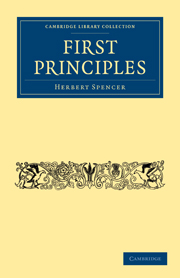Book contents
- Frontmatter
- PREFACE
- Contents
- PART I THE UNKNOWABLE
- PART II LAWS OF THE KNOWABLE
- I LAWS IN GENERAL
- II THE LAW OF EVOLUTION
- III THE LAW OF EVOLUTION (CONTINUED)
- IV THE CAUSES OF EVOLUTION
- V SPACE, TIME, MATTER, MOTION, AND FORCE
- VI THE INDESTRUCTIBILITY OF MATTER
- VII THE CONTINUITY OF MOTION
- VIII THE PERSISTENCE OF FORCE
- IX THE CORRELATION AND EQUIVALENCE OF FORCES
- X THE DIRECTION OF MOTION
- XI THE RHYTHM OF MOTION
- XII THE CONDITIONS ESSENTIAL TO EVOLUTION
- XIII THE INSTABILITY OF THE HOMOGENEOUS
- XIV THE MULTIPLICATION OF EFFECTS
- XV DIFFERENTIATION AND INTEGRATION
- XVI EQUILIBRATION
VI - THE INDESTRUCTIBILITY OF MATTER
Published online by Cambridge University Press: 29 August 2010
- Frontmatter
- PREFACE
- Contents
- PART I THE UNKNOWABLE
- PART II LAWS OF THE KNOWABLE
- I LAWS IN GENERAL
- II THE LAW OF EVOLUTION
- III THE LAW OF EVOLUTION (CONTINUED)
- IV THE CAUSES OF EVOLUTION
- V SPACE, TIME, MATTER, MOTION, AND FORCE
- VI THE INDESTRUCTIBILITY OF MATTER
- VII THE CONTINUITY OF MOTION
- VIII THE PERSISTENCE OF FORCE
- IX THE CORRELATION AND EQUIVALENCE OF FORCES
- X THE DIRECTION OF MOTION
- XI THE RHYTHM OF MOTION
- XII THE CONDITIONS ESSENTIAL TO EVOLUTION
- XIII THE INSTABILITY OF THE HOMOGENEOUS
- XIV THE MULTIPLICATION OF EFFECTS
- XV DIFFERENTIATION AND INTEGRATION
- XVI EQUILIBRATION
Summary
§ 66. Not because the truth is unfamiliar, is it needful here to say something concerning the indestructibility of Matter; but partly because the symmetry of our argument demands the enunciation of this truth, and partly because the evidence on which it is accepted requires examination. Could it be shown, or could it with any rationality be even supposed, that Matter, either in its aggregates or in its units, ever became non-existent, there would be an end to the inquiry on which we are now setting out. Evolution, considered as a re-arrangement of parts, could not be scientifically explained, if, during its course, any of the parts might arise out of nothing or might lapse into nothing. The question would no longer be one comprehending only the forces and motions by which the re-arrangement is effected; but would involve an incalculable element, and would hence be insoluble. Clearly, therefore, the indestructibility of Matter is an indispensable axiom.
So far from being admitted as a self-evident truth, this would, in primitive times, have been rejected as a self-evident error. There was once universally current, a notion that things could vanish into absolute nothing, or arise out of absolute nothing. If we analyze early superstitions, or that faith in magic which was general in later times and even still survives among the uncultured, we find one of its postulates to be, that by some potent spell Matter can be called out of nonentity, and can be made non-existent.
- Type
- Chapter
- Information
- First Principles , pp. 238 - 245Publisher: Cambridge University PressPrint publication year: 2009First published in: 1862



